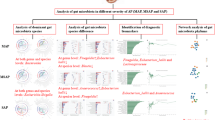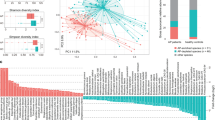Abstract
Background
The gut is implicated in the pathogenesis of acute pancreatitis (AP) and the infectious complications of AP are commonly associated with enteric bacteria, yet whether gut microbiota dysbiosis participants in AP severity remains largely unknown.
Methods
We collected clinical information and fecal samples from 165 adult participants, including 41 with mild AP (MAP), 59 with moderately severe AP (MSAP), 30 with severe AP (SAP) and 35 healthy controls (HC). The serum inflammatory cytokines and gut barrier indexes were detected. Male C57BL/6 mice with AP were established and injuries of pancreas were evaluated in antibiotic-treated mice, germ-free mice as well as those transplanted with fecal microbiota. The gut microbiota was analyzed by 16S rRNA gene sequencing.
Results
The structure of gut microbiota was significantly different between AP and HC, and the disturbed microbiota was closely correlated with systematic inflammation and gut barrier dysfunction. Notably, the microbial composition changed further with the worsening of AP and the abundance of beneficial bacteria such as Blautia was decreased in SAP compared with MAP and MSAP. The increased capacity for the inferred pathway, bacterial invasion of epithelial cells in AP, highly correlated with the abundance of Escherichia–Shigella. Furthermore, the antibiotic-treated mice and germ-free mice exhibited alleviated pancreatic injury after AP induction and subsequent fecal microbiota transplantation in turn exacerbated the disease.
Conclusions
This study identifies the gut microbiota as an important mediator during AP and its dysbiosis is associated with AP severity, which suggests its role as potential therapeutic target.






Similar content being viewed by others
References
Shah AU, Sarwar A, Orabi AI, et al. Protease activation during in vivo pancreatitis is dependent on calcineurin activation. Am J Physiol Gastrointest Liver Physiol. 2009;297:G967–73.
Banks PA, Bollen TL, Dervenis C, et al. Classification of acute pancreatitis-2012: revision of the Atlanta classification and definitions by international consensus. Gut. 2013;62:102–11.
Pezzilli R, Uomo G, Zerbi A, et al. Diagnosis and treatment of acute pancreatitis: the position statement of the Italian Association for the study of the pancreas. Dig Liver Dis. 2008;40:803–8.
Fishman JE, Levy G, Alli V, et al. The intestinal mucus layer is a critical component of the gut barrier that is damaged during acute pancreatitis. Shock. 2014;42:264–70.
Capurso G, Zerboni G, Signoretti M, et al. Role of the gut barrier in acute pancreatitis. J Clin Gastroenterol. 2012;46(Suppl):S46–51.
Desai MS, Seekatz AM, Koropatkin NM, et al. A dietary fiber-deprived gut microbiota degrades the colonic mucus barrier and enhances pathogen susceptibility. Cell. 2016;167(1339–53):e21.
Gil-Cardoso K, Gines I, Pinent M, et al. Effects of flavonoids on intestinal inflammation, barrier integrity and changes in gut microbiota during diet-induced obesity. Nutr Res Rev. 2016;29:234–48.
Xue L, He J, Gao N, et al. Probiotics may delay the progression of nonalcoholic fatty liver disease by restoring the gut microbiota structure and improving intestinal endotoxemia. Sci Rep. 2017;7:45176.
De Palma G, Lynch MD, Lu J, et al. Transplantation of fecal microbiota from patients with irritable bowel syndrome alters gut function and behavior in recipient mice. Sci Transl Med. 2017;9(379). https://doi.org/10.1126/scitranslmed.aaf6397.
Guo ZZ, Wang P, Yi ZH, et al. The crosstalk between gut inflammation and gastrointestinal disorders during acute pancreatitis. Curr Pharm Des. 2014;20:1051–62.
Tan C, Ling Z, Huang Y, et al. Dysbiosis of intestinal microbiota associated with inflammation involved in the progression of acute pancreatitis. Pancreas. 2015;44:868–75.
Zhang XM, Zhang ZY, Zhang CH, et al. Intestinal microbial community differs between acute pancreatitis patients and healthy volunteers. Biomed Environ Sci. 2018;31:81–6.
Flemer B, Lynch DB, Brown JM, et al. Tumour-associated and non-tumour-associated microbiota in colorectal cancer. Gut. 2017;66:633–43.
Ding SP, Li JC, Jin C. A mouse model of severe acute pancreatitis induced with caerulein and lipopolysaccharide. World J Gastroenterol. 2003;9:584–9.
Chen J, Huang C, Wang J, et al. Dysbiosis of intestinal microbiota and decrease in Paneth cell antimicrobial peptide level during acute necrotizing pancreatitis in rats. PLoS One. 2017;12:e0176583.
Memba R, Duggan SN, Ni Chonchubhair HM, et al. The potential role of gut microbiota in pancreatic disease: a systematic review. Pancreatology. 2017;17:867–74.
Li Q, Wang C, Tang C, et al. Identification and characterization of blood and neutrophil-associated microbiomes in patients with severe acute pancreatitis using next-generation sequencing. Front Cell Infect Microbiol. 2018;8:5.
Arumugam M, Raes J, Pelletier E, et al. Enterotypes of the human gut microbiome. Nature. 2011;473:174–80.
Wu GD, Chen J, Hoffmann C, et al. Linking long-term dietary patterns with gut microbial enterotypes. Science. 2011;334:105–8.
De Andres J, Manzano S, Garcia C, et al. Modulatory effect of three probiotic strains on infants’ gut microbial composition and immunological parameters on a placebo-controlled, double-blind, randomised study. Benef Microbes. 2018;9:573–84.
Routy B, Gopalakrishnan V, Daillere R, et al. The gut microbiota influences anticancer immunosurveillance and general health. Nat Rev Clin Oncol. 2018;15:382–96.
Ryan CM, Schmidt J, Lewandrowski K, et al. Gut macromolecular permeability in pancreatitis correlates with severity of disease in rats. Gastroenterology. 1993;104:890–5.
Ammori BJ. Role of the gut in the course of severe acute pancreatitis. Pancreas. 2003;26:122–9.
Liu H, Li W, Wang X, et al. Early gut mucosal dysfunction in patients with acute pancreatitis. Pancreas. 2008;36:192–6.
Besselink MG, van Santvoort HC, Boermeester MA, et al. Timing and impact of infections in acute pancreatitis. Br J Surg. 2009;96:267–73.
Chen J, Kang B, Jiang Q, et al. Alpha-Ketoglutarate in low-protein diets for growing pigs: effects on cecal microbial communities and parameters of microbial metabolism. Front Microbiol. 2018;9:1057.
Ma N, Wu Y, Xie F, et al. Dimethyl fumarate reduces the risk of mycotoxins via improving intestinal barrier and microbiota. Oncotarget. 2017;8:44625–38.
Liu J, Yue S, Yang Z, et al. Oral hydroxysafflor yellow A reduces obesity in mice by modulating the gut microbiota and serum metabolism. Pharmacol Res. 2018;134:40–50.
Kellingray L, Gall GL, Defernez M, et al. Microbial taxonomic and metabolic alterations during faecal microbiota transplantation to treat Clostridium difficile infection. J Infect. 2018;77(2):107–118.
Takahashi K, Nishida A, Fujimoto T, et al. Reduced abundance of butyrate-producing bacteria species in the fecal microbial community in Crohn’s disease. Digestion. 2016;93:59–65.
Rios-Covian D, Ruas-Madiedo P, Margolles A, et al. Intestinal short chain fatty acids and their link with diet and human health. Front Microbiol. 2016;7:185.
De Filippo C, Cavalieri D, Di Paola M, et al. Impact of diet in shaping gut microbiota revealed by a comparative study in children from Europe and rural Africa. Proc Natl Acad Sci USA. 2010;107:14691–6.
Wong JM, de Souza R, Kendall CW, et al. Colonic health: fermentation and short chain fatty acids. J Clin Gastroenterol. 2006;40:235–43.
Tedelind S, Westberg F, Kjerrulf M, et al. Anti-inflammatory properties of the short-chain fatty acids acetate and propionate: a study with relevance to inflammatory bowel disease. World J Gastroenterol. 2007;13:2826–32.
Kelly CJ, Zheng L, Campbell EL, et al. Crosstalk between microbiota-derived short-chain fatty acids and intestinal epithelial HIF augments tissue barrier function. Cell Host Microbe. 2015;17:662–71.
Ribet D, Cossart P. How bacterial pathogens colonize their hosts and invade deeper tissues. Microbes Infect. 2015;17:173–83.
Li Q, Wang C, Tang C, et al. Bacteremia in patients with acute pancreatitis as revealed by 16S ribosomal RNA gene-based techniques*. Crit Care Med. 2013;41:1938–50.
Schmidt PN, Roug S, Hansen EF, et al. Spectrum of microorganisms in infected walled-off pancreatic necrosis—impact on organ failure and mortality. Pancreatology. 2014;14:444–9.
Hanna EM, Hamp TJ, McKillop IH, et al. Comparison of culture and molecular techniques for microbial community characterization in infected necrotizing pancreatitis. J Surg Res. 2014;191:362–9.
Huang C, Chen J, Wang J, et al. Dysbiosis of intestinal microbiota and decreased antimicrobial peptide level in Paneth cells during hypertriglyceridemia-related acute necrotizing pancreatitis in rats. Front Microbiol. 2017;8:776.
Acknowledgements
The authors are grateful for all the subjects who participated in this study. The authors acknowledge Dr. Jianping Liu in Karolinska Institute, Sweden for revising the manuscript.
Funding
This work was supported by grants from the National Natural Science Foundation of China (81760120, 81460116), the Key Research and Development Program from the Science and Technology Department of Jiangxi Province (no. 20171BBG70084).
Author information
Authors and Affiliations
Contributions
NL and YC designed and supervised the project. YZ obtained funding. YZ, LX, WH and XS performed clinical diagnosis and selected proper cases for this project. YL collected the fecal samples and recorded clinical data. YL, YC and CH measured the clinical parameters. YC and XL performed the animal experiments. CH, JH, JZ, LL and CL performed bioinformatics and statistical analysis and interpreted data. CH drafted the manuscript. YZ and QC revised the manuscript for important content.
Corresponding author
Ethics declarations
Conflict of interest
The authors declare that they have no competing interests.
Electronic supplementary material
Below is the link to the electronic supplementary material.
Rights and permissions
About this article
Cite this article
Zhu, Y., He, C., Li, X. et al. Gut microbiota dysbiosis worsens the severity of acute pancreatitis in patients and mice. J Gastroenterol 54, 347–358 (2019). https://doi.org/10.1007/s00535-018-1529-0
Received:
Accepted:
Published:
Issue Date:
DOI: https://doi.org/10.1007/s00535-018-1529-0




